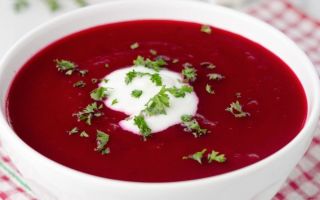Content
Borscht during breastfeeding does not belong to the category of prohibited foods and can be of great benefit. But you need to use it with caution and according to the rules so that the hot soup does not harm the baby.
Features of the use of borscht while breastfeeding
After giving birth, women are forced to severely limit their diet. Although both a young mother and a nursing infant require a huge amount of nutrients, many foods are prohibited when feeding. A newborn baby, along with milk, receives all the substances that a mother uses with food, and simply cannot absorb some of them.
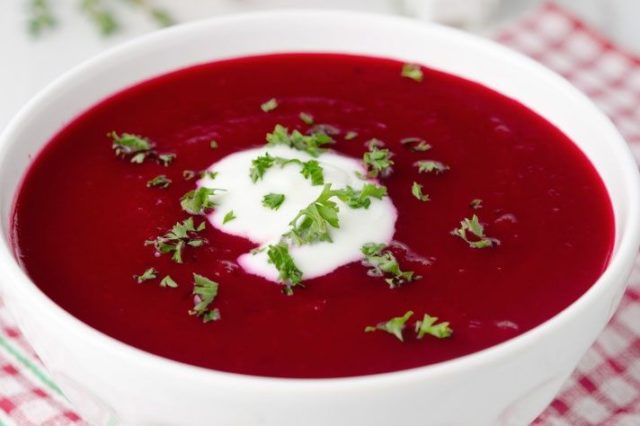
Borscht during breastfeeding must be prepared especially carefully, paying special attention to its components. Meat should be chosen lean and low-fat, and vegetables should be hypoallergenic and with a minimum amount of coarse fiber. You cannot add hot spices to the dish. If the needs of the child are taken into account when cooking, then the dish will not harm, but it will be of great benefit.
Is it possible to eat borscht while breastfeeding
During the feeding period, women have to give up fatty and high-calorie foods, many vegetables and most fruits, canned and spicy foods. Borsch helps to fill the lack of calories and nutrients. It contains not only vegetables, but also a nutritious broth with pieces of meat.
When used correctly, the soup helps:
- eliminate the lack of calories and cope with hunger;
- get the necessary animal protein from pieces of meat and broth;
- overcome vitamin deficiency with vegetables in the dish.

Borscht can be consumed by a nursing mother of a newborn; it becomes a valuable source of balanced carbohydrates, proteins and fats. It contains fiber that is useful for a young mother, cleansing the body, and amino acids that take part in building muscles in an infant. But the influence of a hot dish on the well-being of an infant depends on the composition.
Is it possible for a borscht with beets for a nursing mother
Beets are one of the main ingredients in this classic soup. It is she who gives the dish its characteristic taste and red color. The benefits of beets are that they contain a lot of dietary fiber, saturates the body of mothers and babies with vitamins and organic acids, and is a source of silicon, manganese, chromium and copper.
Beetroot soup can be consumed by a nursing mother when feeding. But it should be borne in mind that the fiber in the vegetable can irritate the intestines of the newborn and even lead to indigestion.To prevent this from happening, you need to properly boil the vegetable until it is completely softened, this increases the digestibility. Beetroot soup should be tried carefully and in small quantities for the first time to make sure it does not cause allergies in a nursing baby.
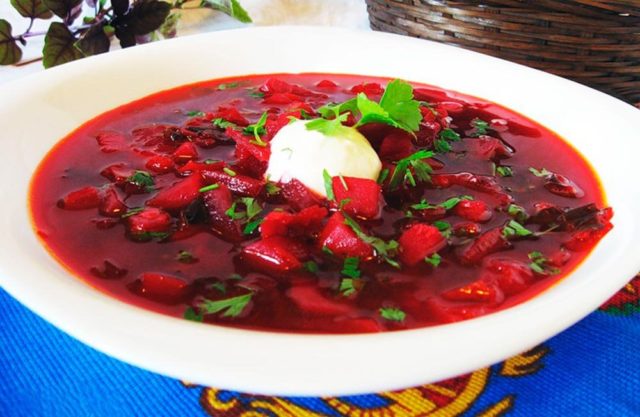
Is it possible for a borscht with cabbage for a nursing mother
Another common ingredient in the first course is cabbage, which contains many vitamins C and K. For all the benefits of a vegetable, it has a serious drawback - cabbage often leads to increased gas formation. This causes inconvenience even for an adult, and in an infant it can cause constipation and painful colic.
Cabbage can only be added to a dish for a nursing mother in a well-boiled form and in small quantities. Since white cabbage is especially conducive to gas formation, when breastfeeding it is recommended to replace cauliflower or broccoli, they have a milder effect.
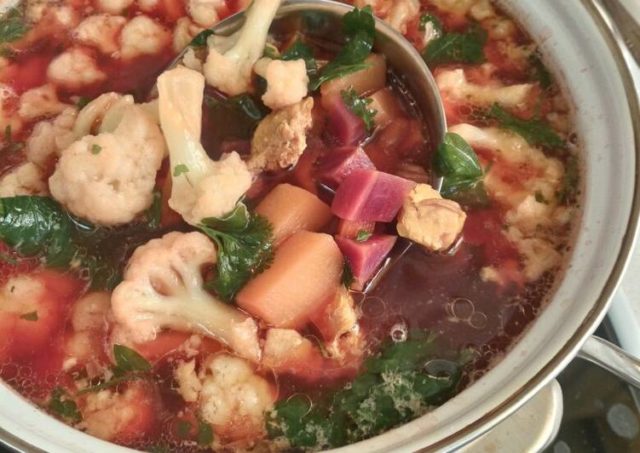
Is green borscht possible for nursing mothers
If beets cause allergies or intestinal upset in babies, then they can be replaced with sorrel, and an egg can be put instead of meat. The so-called green borscht with egg and sorrel can be of great benefit when breastfeeding. It improves digestion, strengthens blood vessels, and most importantly, sorrel intolerance is extremely rare.
When adding sorrel to borsch with HS, you need to remember that the plant contains many organic acids. The amount of grass should be small, no more than a couple of bunches.
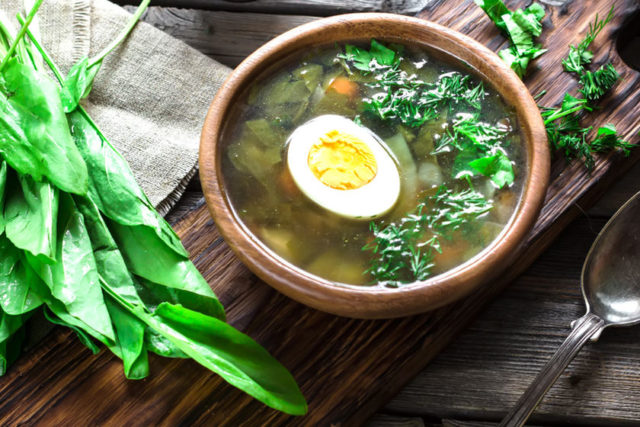
Contraindications to sorrel are only kidney stones and bladder stones, as well as acute gastritis in a nursing mother while feeding. With these diseases, you will have to give up green soup.
Is it possible to borsch with vinegar while breastfeeding
To give the borsch a bright red color, a little 9% vinegar is often added to it. Such a preservative not only makes the dish more beautiful, but also improves its taste and also prolongs the shelf life.
However, while breastfeeding, vinegar should be avoided. A newborn baby can react negatively to acetic acid even in small amounts.

When can you breastfeed borscht
During the GV period, borscht for a nursing mother is allowed. However, it is not possible to introduce it into the diet immediately, you need to adhere to a reasonable time frame. If at any of the stages of lactation a baby develops a negative reaction, the dish will need to be excluded and try to reintroduce it into the diet no earlier than a month later.
Borscht when breastfeeding in the first month
In the first month of life, the newborn's body remains especially sensitive and reacts sharply to any unusual food. Since the healthy soup contains potentially allergenic high-fiber vegetables and broth, the dish can lead to severe stomach upset in an infant.
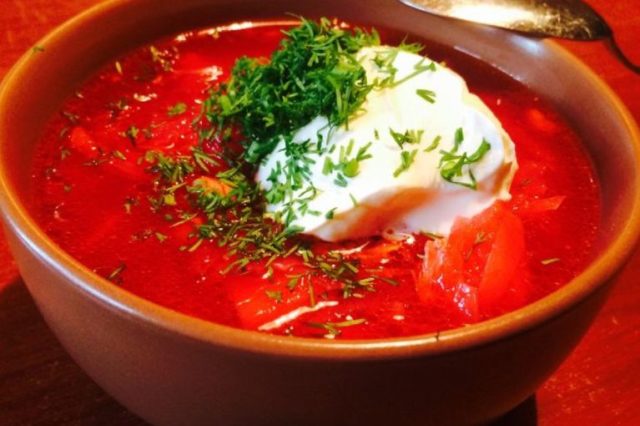
In the first month, it is better for a nursing mother not to experiment with healthy soup. If you introduce a dish into the diet too early, then the baby will have skin rashes, flatulence and colic in the abdomen.
Borscht when breastfeeding in the second month
In the second month of life, a newborn baby adapts slightly to food.During this period, new dishes can be carefully added to the diet of a nursing mother, including dietary low-fat borscht. In the second month, you need to try the soup without spices and bay leaves, without adding sour cream, or lemon juice, and even more so vinegar
For the first time, eat a nutritious soup in the morning, in the amount of only 1 large spoon. Thus, until the evening it will be possible to understand whether the new dish is well accepted by the infant's body, or whether it is better to postpone the introduction of the product into the diet during feeding until a later date.
Borscht when breastfeeding for the 3rd month
In the third month of life, most infants calmly perceive new foods in the mother's diet. The likelihood of developing a negative reaction to borscht decreases, it is in the 3rd month of feeding that it is best to introduce the dish into the menu.
You still need to start trying the soup in minimal quantities. For a start, just 1 spoon will be enough, if beets, cabbage or other ingredients cause digestive upset in a nursing baby, this will become noticeable by the evening. If no alarming symptoms appear either on this day or the next morning, the dish can be left in the diet.

Rules for the use of borscht while breastfeeding
So that the soup does not harm a small child, it must be consumed in accordance with several rules:
- A new dish should be introduced into the menu at a time when the child is completely healthy and does not suffer from colic or teething. If the child is not feeling well, then, most likely, the soup will cause a negative reaction.
- You need to try the soup in the afternoon or in the morning in order to be able to observe the baby's behavior until the evening. Even if the symptoms of food intolerance have not arisen, for complete confidence it is worth waiting for the next day.
- No other new foods can be tried on the same day with the soup.
If the new product was successfully introduced into the diet with HS, then it can then be consumed not only in the morning, but also in the afternoon and towards the evening. Moreover, any foods during lactation should be eaten in moderation. The daily dosage of the soup should not exceed 200-250 g.
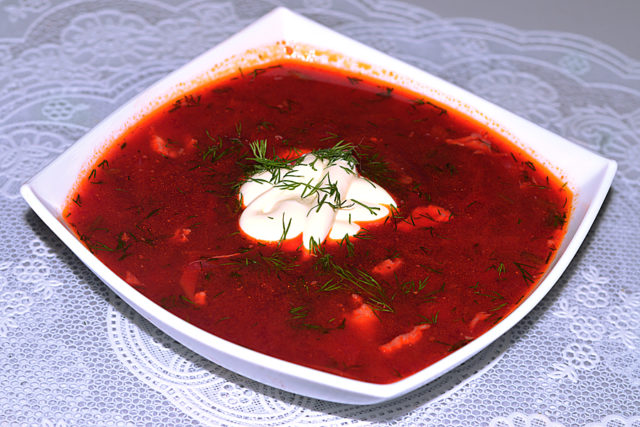
Useful Tips
In order for borscht to be nutritious and tasty during lactation, but as harmless as possible for a nursing baby, you need to take into account several recommendations:
- Vegetables for boiling in soup must be taken fresh. According to the classic recipe, cabbage, beets, tomatoes and carrots are recommended to be fried before cooking, but when breastfeeding, it is better to refuse frying.
- For a healthy dish, you need to choose lean, dietary meat, for example, chicken fillet, lean beef or veal.
- Tomato paste, indicated in many recipes, is best replaced with fresh tomatoes, ideally they should be of yellow hypoallergenic varieties. Peel the tomatoes before cooking.
- Instead of white cabbage, it is better to take cauliflower or broccoli. They act on digestion softer, and bring no less benefits.
In the first months of feeding, the dish is best consumed without garlic, onions and seasonings. If desired, you can add a little salt and bay leaf, but the latter should be kept in the soup for only a few minutes and removed. You can decorate the soup with low-fat sour cream and fresh herbs, but in small quantities.
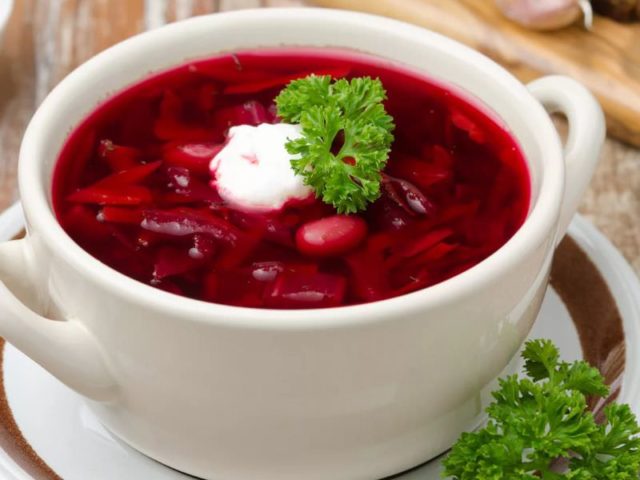
Conclusion
Borscht during breastfeeding is not prohibited, but it should be introduced into the diet at the earliest 2 months after childbirth. You need to be very careful when trying a dish for the first time.Throughout lactation, dietary products should be used without hot spices.

